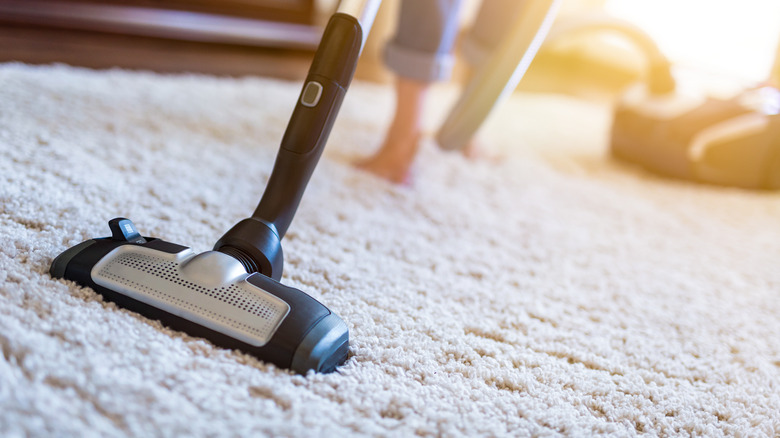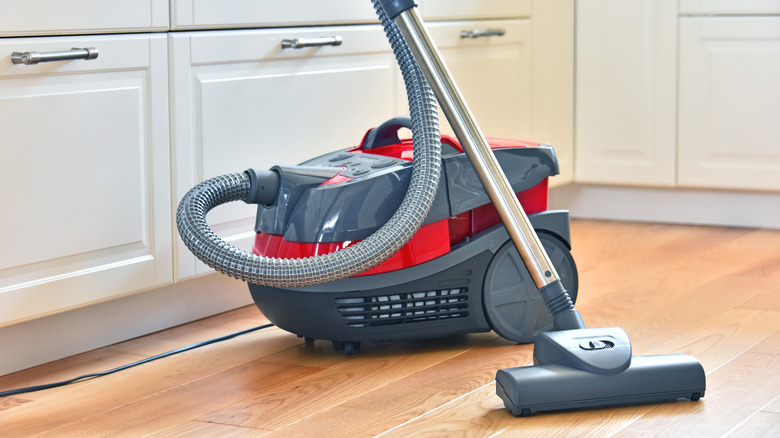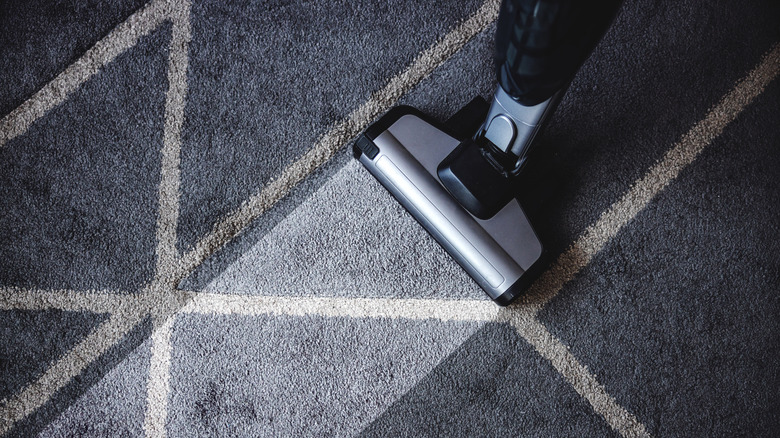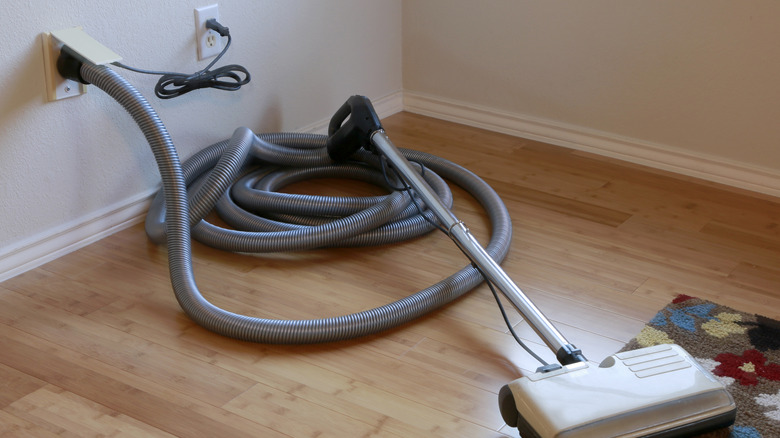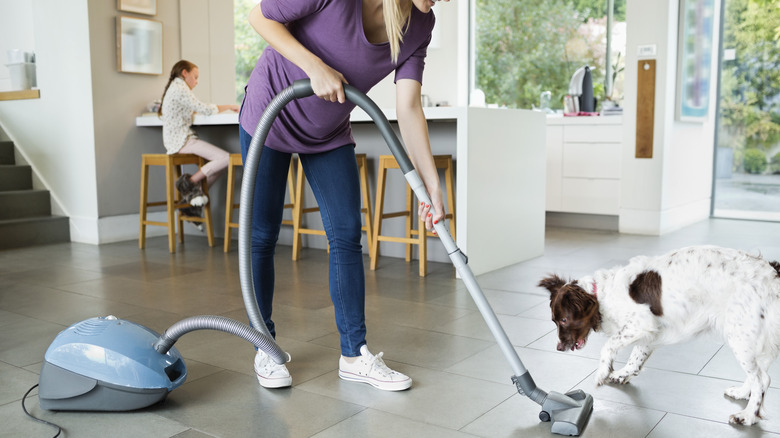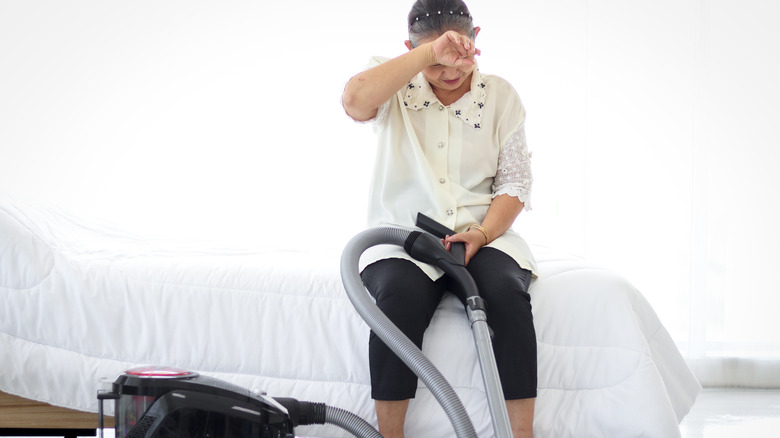Here Are The Signs Your Vacuum Cleaner Is Too Old
There is no doubt that a vacuum cleaner is an essential appliance for every household. Besides eliminating dust in your home, this machine also goes a long way in removing dust-related allergens, via Achooallery. While that is true, it also goes without saying that your vacuum cleaner certainly won't last forever. Like any other appliance in your home, your vacuum cleaner's longevity depends entirely on its frequency of use and how well you take care of it.
Instead of waiting until your vacuum cleaner stops working on a random day of the week, it is crucial to be aware of the signs that show your appliance is running on its last legs. Remember, replacing your vacuum cleaner in time will save you the trouble of it breaking down when you need it the most. The good news is that your vacuum cleaner won't abandon you out of the blue; it shows signs early enough. Here are some common ones you should keep an eye out for.
If it is more than eight years
A vacuum cleaner doesn't come with an expiration date; determining exactly how long your vacuum should last isn't that obvious. However, according to Consumer Reports, a typical vacuum lasts about eight years. But, it's needless to say that the longevity of any appliance, including your prized vacuum, depends entirely on use. To put this into perspective, if you are a vacuum-everyday type of person, you are likely to wear your vacuum sooner than someone who uses it once a week.
Also, if you are living in a small apartment, you won't use your vacuum nearly as much compared to a family living in a 3500-square-foot bungalow. It is also worth mentioning that vacuums from popular brands tend to last longer than their cheap counterparts. Essentially, the age of your vacuum is an excellent indicator that you might need to start saving up for a new machine. If you are fortunate enough to get over eight years of service, consider buying a suitable replacement.
Loss of suction
Among the most obvious signs that your vacuum has seen better days is if it starts losing suction power during use. If you suddenly need to go over the same spot more than once, you should know right from the get-go that there is a problem. However, it is also important to remember that some brands are just like that, so if you have been dealing with the same problem from the beginning, chances are it is a brand issue. In some scenarios, it is possible to fix this problem.
According to The Vacmaster, some problems that might cause the loss of suction on your machine include the incorrect height setting, a damaged vacuum belt, or a blocked hose, among several other causes. First, try to identify the specific cause of the problem. You might need to get the help of a handyperson if you don't have the skills to diagnose the problem yourself. Nonetheless, if you have been using your vacuum for years and the problem is just starting to manifest, getting a suitable replacement is the right course of action in this particular scenario.
Burning smell
A burning smell from your vacuum cleaner should be a good enough sign that your machine has a problem. Not every case needs to be a cause for alarm; nonetheless, you must investigate. It is also important to mention that if there is a peculiar smell of burning plastic accompanied by the machine turning off unnecessarily, you should consider getting a new vacuum. Journal of Histology & Histopathology mentions that the burning smell is often a result of motor damage that causes intense heat that burns the dirt or plastic if it gets hot enough.
In such a scenario, you might need to call a repairer to have a look at your vacuum cleaner and possibly remedy the problem. However, if the smell persists even after the repairs, you should accept that your vacuum has outlived its usefulness and consider replacing it with a new one. You shouldn't ignore this problem; the vacuum could catch fire in the worst-case scenario.
If it's getting unusually louder
A completely silent vacuum cleaner doesn't exist. Most vacuums are usually loud that they scare off pets or even wake up sleeping children. While this is true, it is worth noting that modern vacuums are less noisy compared to their old counterparts. If you have been using your vacuum for several years, you know the expected noise level when it is utilized. This makes it relatively easy to tell whenever the noise level gets unusually more audible. There are plenty of reasons why your vacuum is suddenly getting louder than last time.
According to Gadget Review, common reasons include a failing motor and a slipping or warped belt, to mention a few. A repairer can fix this problem in most cases; however, if your machine is old, the best thing you can do is to get a suitable replacement. You shouldn't ignore this change, whether it is a high pitch sound or a roar. Remember, it could be your vacuum's last cry for help before it completely fails on you.
It's no longer fit for the job
With a change in your lifestyle, you will also need a vacuum cleaner to match. According to IPC Worldwide, choosing the right vacuum cleaner begins by first understanding your individual needs. It might reach a time when your old vacuum is not doing it for you any longer. Perhaps you have just added a new furry friend to the family; you will need a modern and more powerful vacuum to deal with all the fur and dander. Maybe, you have downgraded to a smaller house and replaced your wall-to-wall carpet with hardwood floors.
In this case, the super-strength vacuum will no longer be necessary. Your old appliance might even have torn wheels that may destroy your current flooring. While some vacuums are more versatile, the truth is that your old vacuum might not be able to keep up with the changes in your lifestyle. Regardless of the reason, if your current vacuum cleaner cannot keep up with your needs, it is time to purchase a new model that will make your work easier.

